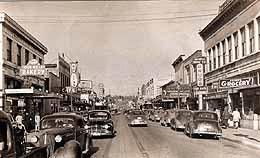In 1941, as Fort Lewis soldiers and Olympia-based sailors began arriving in Olympia due to the start of World War II, the citizens open a Servicemen Center in the Old Capitol Building. This center will become a United Service Organizations (USO) facility the next year, offering refreshments, writing and reading rooms, and a dormitory for overnight stays.
Founding the USO
The United Service Organizations (USO), a national organization, was incorporated on February 4, 1941. It was made up of six agencies: YMCA, YWCA, Salvation Army, Jewish Welfare Bureau, National Catholic Community Services, and Travelers Aid. Early in the war, the agencies had joined together under the name, United Welfare Committee for Defense. The committee sent President Franklin D. Roosevelt (1882-1945) a telegram requesting a meeting with government officials to present its views. In December the committee met with Paul V. McNutt (1891-1955), head of the Federal Security Agency, whose responsibilities included recreation. Roosevelt in turn directed the Federal Security Agency to work with the welfare committee to come up with an effective program.
President Roosevelt, recognizing the interest of citizen-soldiers in seeking civilian recreation, believed that community-based programs could best satisfy this reality. Additionally, providing community recreation centers would reduce the perceived threat of large number of military personnel hanging out with nothing to do. Another advantage would be to enlist local civilian populations, especially women, in the war effort, giving them meaningful functions. The USO was in the position to hire professional staff, and this gave it a tremendous advantage in providing an effective recreational and morale-building organization for service men and women far from home during wartime.
USO in Olympia
A new government-constructed USO building on E 4th Avenue was dedicated in February 1942. A fire destroyed this structure in 1944 and it was replaced with another federal building, at 1314 E 4th Street and dedicated November 1944. The new clubhouse comprised 11,000 square-feet with a lounge finished in knotty pine, a fireplace, hobby rooms, snack bar, and six showers. A dormitory opened on Legion Way.
The Fourth Street club had Blind Date Dances that were a huge success and a regular event. These dances included an intermission contest where six soldiers, two at a time, sat behind a curtain, and answered questions by telephone with one winning a date with a young hostess. The three winners and their dates received a fancy dinner in the 'Super Dragon Room', a decorated club room.
Some other popular events were Sunday morning breakfasts, monthly birthday parties for those with a birthday that month, and holiday dinners at Thanksgiving and Christmas. For example, the 1944 Christmas dinner was prepared by local chef Adolph Chialvo (d. 1946) who cooked 25 turkeys and all the trimmings served by the Elks Fraternal. Each Christmas local families invited soldiers into their homes for the holidays.
During World War II, with the draft and patriotic enlistments, many skilled musicians and other performers served in the military. These performers found themselves giving shows on post and town USOs. In 1946 Private Cesare Curzi (b. 1915), an Oakland Opera tenor, sang at the Olympia and Tacoma USOs. Following his military service he became a star tenor with the San Francisco Opera Company.
The Olympia USO remained in service until April 1947. It was one of the last Washington state USOs to close.

